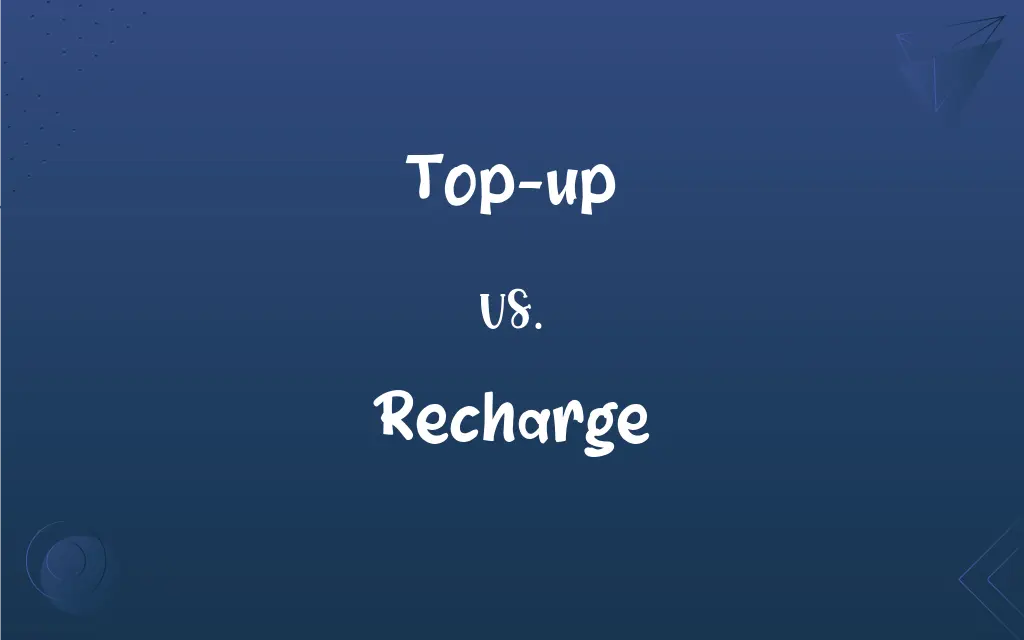Top-up vs. Recharge: What's the Difference?
Edited by Harlon Moss || By Janet White || Published on January 4, 2024
Top-up generally means adding value or funds to an account, whereas recharge usually refers to restoring power or energy to a device.

Key Differences
Top-up is often used in the context of adding credit to a mobile phone or a service account, implying a financial transaction. Recharge, on the other hand, typically refers to restoring the battery life of electronic devices, such as phones or electric vehicles.
When you top-up your prepaid phone account, you are essentially increasing your balance to continue using the service. In contrast, recharging a device means you are replenishing its energy source, usually by connecting it to a power supply.
The term top-up can also be applied more broadly to mean adding to or supplementing something, not limited to financial contexts. Recharge, however, is more often associated with energy or power restoration, whether it's for a device or metaphorically, as in recharging one's personal energy.
Top-up transactions can be done through various means like online payments, vouchers, or direct debit. Recharging a device usually involves a physical action, like plugging it into a charging port or replacing its batteries.
The convenience of a top-up is in its flexibility to add varying amounts as needed. Recharging, especially for electronic devices, often requires a set amount of time to fully restore power.
ADVERTISEMENT
Comparison Chart
Primary Context
Financial transactions
Power or energy restoration
Usage Example
Mobile phone balance, service accounts
Electronic devices, personal energy
Process
Adding value or funds
Restoring battery life or energy
Means
Online payments, vouchers, etc.
Plugging into a power source, resting
Flexibility
Varying amounts can be added
Often requires a set amount of time or conditions
ADVERTISEMENT
Top-up and Recharge Definitions
Top-up
Adding funds to a service account.
I need to top-up my transit card before my trip.
Recharge
Gaining back energy after exhaustion.
A good night's sleep helped me recharge.
Top-up
Enhancing or adding to an existing amount.
I decided to top-up my savings account each month.
Recharge
Refilling a battery or power source.
Don't forget to recharge the camera batteries.
Top-up
Increasing the balance of a prepaid account.
I top-up my mobile phone online for convenience.
Recharge
Restoring power to a device.
My phone's battery is low; it needs a recharge.
Top-up
Refilling or completing to the full level.
Top-up the car's fuel tank before our journey.
Recharge
Revitalizing oneself mentally or physically.
A weekend getaway is perfect to recharge.
Top-up
Supplementing something that's running low.
Let's top-up the printer's ink cartridges.
Recharge
Replenishing the energy levels of an electronic device.
My laptop is recharging; I'll use it in an hour.
Top-up
That serves as an addition
English university students will have to pay top-up fees.
Recharge
To charge again, especially to reenergize a storage battery.
Top-up
An addition.
Recharge
(transitive) To charge an electric battery after its power has been consumed.
Top-up
A serving of drink used to top up an existing glass.
Top-up
(insurance) An additional premium paid over the initial premium in order to increase benefit values.
Top-up
Additional credit purchased for a mobile phone.
I added a $20 top-up on my cellphone's data plan.
Top-up
(medicine) A dose of epidural anesthetic added to previously injected spinal anesthetic in combined spinal-epidural anesthesia
Top-up
(education) The situation where a student who holds a qualification equivalent to part of a degree course is then accepted onto a degree course at an intermediate point, without having to start it from the beginning.
Top-up
An amount needed to restore something to its former level
FAQs
Can top-up be used for services other than mobile phones?
Yes, it can be used for various services like transit cards or online accounts.
What does top-up mean?
Adding funds or value to an account or service.
How do you top-up a prepaid phone?
Through online payment, buying a voucher, or visiting a store.
Can recharge be done wirelessly?
Yes, many modern devices support wireless recharging.
Does recharge always involve electricity?
Mostly, but it can also mean restoring personal energy.
Is top-up always an immediate process?
Yes, it typically reflects immediately in your account balance.
Are top-up and recharge interchangeable terms?
No, they refer to different processes and contexts.
How long does a recharge last?
It depends on the device's usage and battery efficiency.
Can rechargeable batteries be overcharged?
Yes, but modern devices often have mechanisms to prevent this.
What is recharging in terms of electronics?
Restoring the battery life of electronic devices.
Do all devices have the same recharge time?
No, recharge times vary based on the device and battery capacity.
Is there a limit to how much you can top-up?
Yes, most services have a maximum top-up limit.
Can you top-up someone else's account?
Yes, you can top-up others' accounts, given you have the necessary details.
What happens if you don't top-up a prepaid service?
The service may be suspended or restricted until you top-up.
Can recharging improve battery life?
Regular recharging helps maintain battery health, but won't necessarily improve it.
Is it possible to recharge without a charger?
Not usually, unless the device supports alternative charging methods like solar.
Is recharging harmful to devices if done frequently?
It depends on the device and battery type; some may degrade with frequent recharging.
Can top-ups expire?
Yes, some top-ups, especially in prepaid services, have an expiration date.
Are there different methods of top-up?
Yes, including online, through vouchers, or direct debit.
Does recharging a device when it's half-full harm the battery?
This depends on the battery type; some modern batteries handle partial recharges well.
About Author
Written by
Janet WhiteJanet White has been an esteemed writer and blogger for Difference Wiki. Holding a Master's degree in Science and Medical Journalism from the prestigious Boston University, she has consistently demonstrated her expertise and passion for her field. When she's not immersed in her work, Janet relishes her time exercising, delving into a good book, and cherishing moments with friends and family.
Edited by
Harlon MossHarlon is a seasoned quality moderator and accomplished content writer for Difference Wiki. An alumnus of the prestigious University of California, he earned his degree in Computer Science. Leveraging his academic background, Harlon brings a meticulous and informed perspective to his work, ensuring content accuracy and excellence.






































































